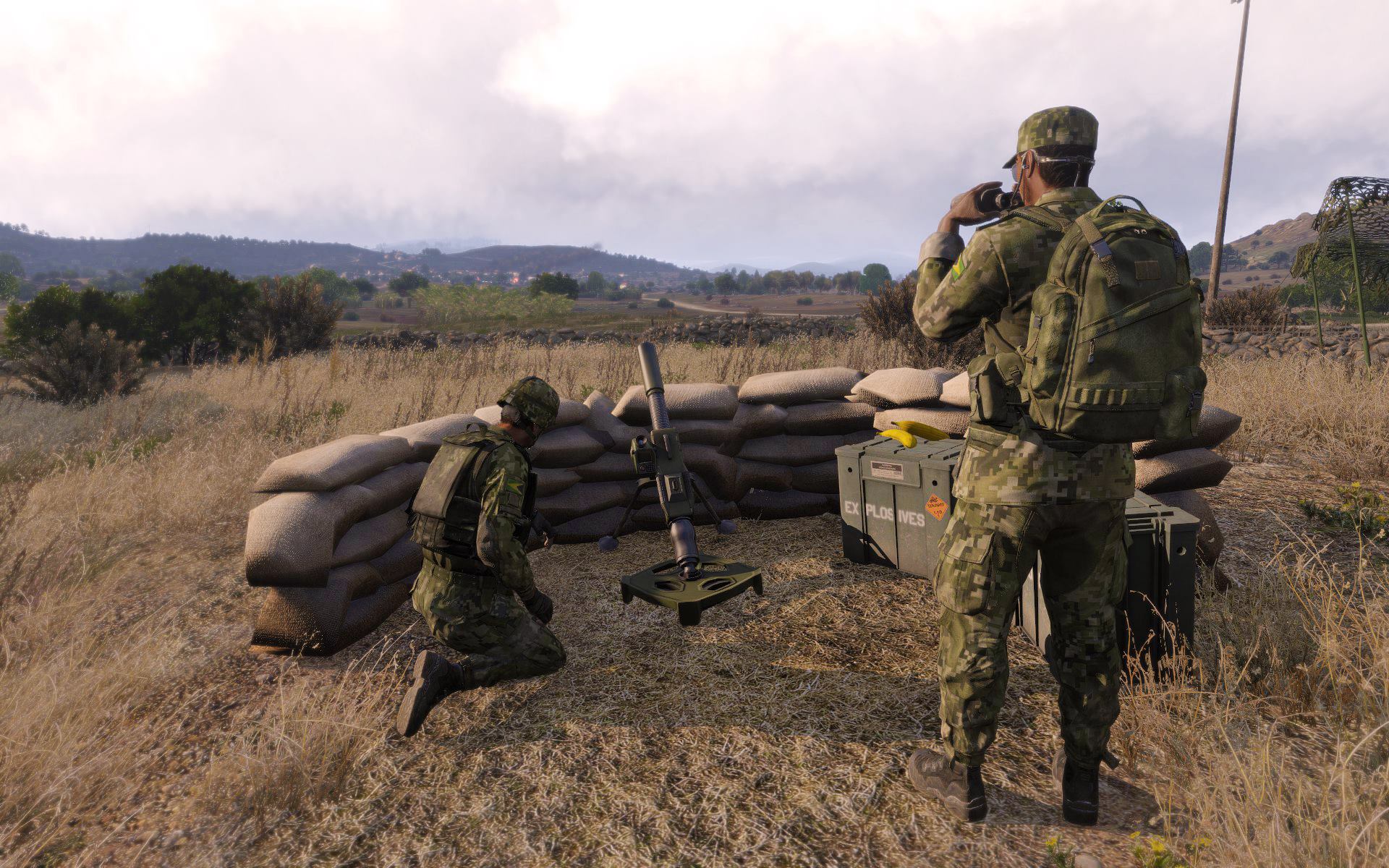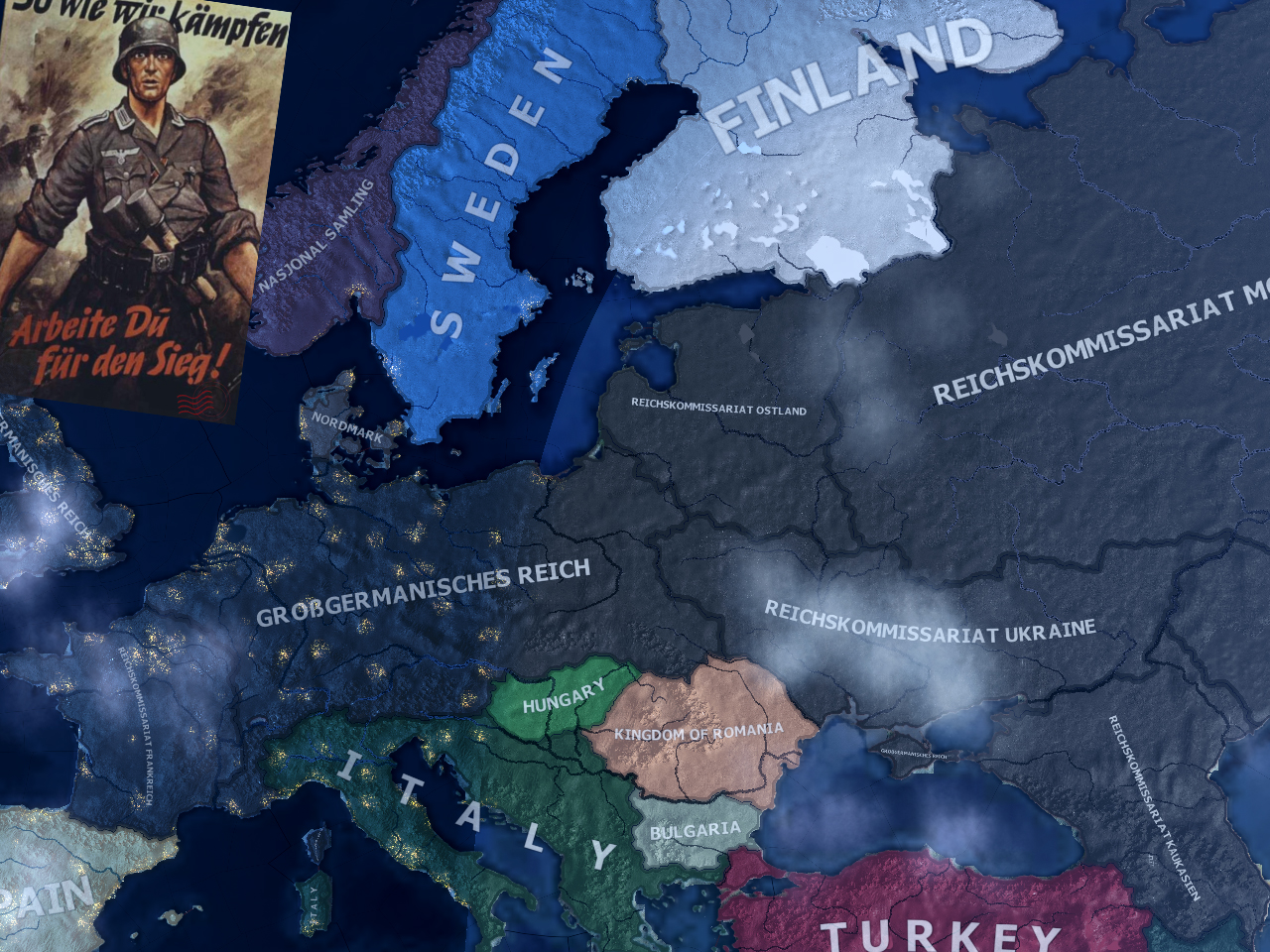The modders obsessed with making the PC's most realistic sims even more realistic
Arma 3 simulates bullet gravity. Why not add wind, air pressure, humidity, and the Coriolis effect?

The ACE3 modders are a loose confederation of Europeans and Americans—some in Germany, some in Scotland, most in their 20s and 30s, with a token 51-year old Seattleite filling out the ranks. Every day, they gather in a Slack channel to make Arma 3, Bohemia Interactive's famously complex shooter, more punishing than anyone could imagine.
"[Our] Advanced Ballistics does an extremely realistic bullet simulation with wind, Coriolis and magnus effect, air pressure, and humidity all taken into account. Gravity is the only thing that affects bullets in the base game," says BaerMitUmlaut, one of the core scripters on the ACE3 mod, when I ask him about the features he's most proud of. "We can accurately replicate the data that real life ballistic calculators deliver, and that is quite astonishing to me."
The ACE mod has been around since the first Arma, and their modus operandi has always been the same. They take the mechanics that Bohemia abstracts out of the player's hands, (like say, weapon jamming or biological fatigue) and make them part of the game. Bohemia, of course, prides itself on providing perhaps the grittiest military simulation you can find in gaming, but this small group of people are captivated enough by their tactical fantasies to dig through the code to make things somehow more hardcore.
In ACE3, players have to clean off their goggles manually when they get dirty. The function is "shift-alt-T." If you thought Arma 3 was impenetrable, trust me, you haven't seen anything yet.
"I've always been a big fan of the endless possibilities Arma has to offer. But when I've started playing it ... it was fun, no doubt, but it was lacking depth," says Bux, one of the ACE3 Project Leads. "I've never served in the Bundeswehr and didn't know what to expect from [military simulation]. But when I joined my current community I was hooked. Being trained by real life airborne soldiers in communications, movement, tactical thinking, it's just a completely different aspect of my daily life and I enjoy it."
When simulators just aren't real enough
There are plenty of realism mods for games that desperately need some reigning in. Grand Theft Auto 5 obviously never set out to create an authentic version of Los Angeles—this is a franchise where you shake the SWAT team on your tail by painting your car a slightly different color—but if you are the type of person that wants to explore Los Santos as a civilian, there is a one-click scripting pack that will completely rework police A.I., arsenal encumbrance, and the speed of the local trains. That's great, and it's also a complete desecration of the Rockstar ethos. The police aren't supposed to be capable forensics experts in a game where you can steal an experimental jet from a top-secret military base while wearing nothing but a wifebeater.
In ACE3, players have to clean off their goggles manually when they get dirty.
That's what makes a mod like ACE3 so interesting. Bohemia Interactive created Arma to serve a very specific group of players who were turned off by twitchy arena shooters like Call of Duty and Counter-Strike. They found a huge number of people who were into their formula, and learned that they may have underestimated how deep their fascination went. I'm sure Bohemia thought they were doing the world a favor by not outfitting their product with arcane, ultra-complex medical mechanics. The ACE3 guys responded by introducing a system where you literally need to look at a spreadsheet to see how effective your field bandages will be.
The biggest gaming news, reviews and hardware deals
Keep up to date with the most important stories and the best deals, as picked by the PC Gamer team.
This isn't restricted to hardcore military simulations, either. There are dozens of games on Steam that attract super hardcore communities, who will happily go beyond the publisher's limits to build themselves the most authentic experience possible. Richard Armstrong, 25, has actually turned that obsession into a business. His company, Armstrong Powerhouse, is the unassailable authority for Train Simulator add-ons. The bread and butter are his sound packs, in which Armstrong makes the trip out to the trainyard to stick microphones underneath vintage and modern locomotives, documenting all of their crucial grunts to replace the default, one-size-fits-all noises that coat the vanilla game.
"First off, we’ll record the engine at a variety of constant power settings to achieve the loopable sounds that are played when the player is neither powering up or down. After that, we then go through a list of all the possible permutations on how a locomotive can power up," says Armstrong. "Once they are sorted, the engine is shut down which allows us to record static sounds such as the cab handles, switches and horns without any background noise. Finally, the engine is started back up and all being well, we have a full set of recordings to put into Train Simulator."
Train Simulator is (obviously) not a series that sees a ton of casual play. You need to be seriously invested in the magic of hauling freight through the Central European countryside to drop the $25 necessary to get in the door, and the entire swath of DLC tallies up to more than $7,000. So you'd expect that all of those incidental spots of realism—like the mewl of the Class 31—would be implemented at launch. Not so, says Armstrong. A lot of that housekeeping is left to the community.
"Larger companies are great at producing content en masse but the nature of the corporate structure and the necessity to have people involved who may not have railways as their primary interest, means that details can often be lost which very much matter to the enthusiast," he says. "Things such as the distinctive sound of how the brakes hiss when released on a certain type of train, or having realistic physics so your locomotive actually feels like it’s pulling or braking a heavy load, all of these little things come together to create an immersive experience and sadly, sometimes all it takes is one thing to be obviously out of place and immersion is killed. This is what we understand and try to cater for."
The greatest thrill comes from recreating something that has passed into the history books.
Richard Armstrong
The 17-year old modder known as "Algerian General" has a similar philosophy. He built the Darkest Hour mod for Paradox's Hearts of Iron IV, a grand strategy campaign that simulates the political and economic trajectory of every nation on Earth during the tumultuous years before and after World War II. The General wasn't happy with the authenticity of Paradox's vision, so he adjusted everything from the balance of terrain and weather modifiers, to extremely niche historical stuff that was left out, like the Islamic rebellion in Xinjiang, a far-western region of China, in 1937.
"As we all know Paradox took a different approach with Hearts of Iron IV, by simplifying a lot of its mechanics to expand its player base and make it a whole lot more accessible to new players," he says. "Overall, the game is currently too simple and it lacks some complexity, to simply make the game less predictable, giving the player more choices and more decisions to take, which will hopefully make the game more challenging and more enjoyable."

Maybe this confuses you. Is there really that much to gain from a homebrewed gun-jamming mechanic in Arma? Or a suite of engine roars in Train Simulator? Or a forgotten Soviet-led rebellion in Hearts of Iron? Maybe not for the average person, but all of these mods are built to sate a very familiar emotional lust. We all have our own pet projects and microscopic worlds, and while our tastes might be different, we know the comfort in making things just so. Armstrong is a huge rail enthusiast, and he describes the hobby as being in a "constant state of mourning." Older trains are pulled out of service, and all their iconic minutia—the true lifeblood of this community—are sent to the grave.
"They’re the trains we grew up with and remind us of our childhood so when they go, there really is a genuine sense of grief, which probably sounds odd to outsiders!" he says. "The greatest thrill comes from recreating something that has passed into the history books. Turning up the speakers and hearing that rumble of the engine or whine of the electric motor again is a great thing. I often receive contact from customers telling me just this, that our packs have rekindled old memories, and that probably gives me the most satisfaction out of anything."
The games industry tends to mark its progress by streamlining and simplification. You don't need to plot your course in Rainbow 6 anymore, nor are you forced to reckon with unscaled enemies and a leery time limit in Fallout. For the most part, that's a good thing. Video games are generally at their best when they're approachable, with no self-indulgent elitism mucking up the corners. Still though, I'm glad there will always be a cadre of modders serving as a counterbalance.
Developers will continue to search for equilibrative design, and the community will see how far they can push the tech into the unknown reaches of necessary unintuitiveness. Armstrong gets to taste those bygone train horns again, Bux has caught a glimpse of what it's like to be behind enemy lines, the General has finally cooked up a simulation of the Spanish Civil War that satisfies him. They will never go hungry again.

Luke Winkie is a freelance journalist and contributor to many publications, including PC Gamer, The New York Times, Gawker, Slate, and Mel Magazine. In between bouts of writing about Hearthstone, World of Warcraft and Twitch culture here on PC Gamer, Luke also publishes the newsletter On Posting. As a self-described "chronic poster," Luke has "spent hours deep-scrolling through surreptitious Likes tabs to uncover the root of intra-publication beef and broken down quote-tweet animosity like it’s Super Bowl tape." When he graduated from journalism school, he had no idea how bad it was going to get.

